Studies suggest that cutting calories through dietary changes seems to promote weight loss more effectively than does exercise and physical activity. But physical activity also is important in weight control. In an attempt to define the role of exercise in the treatment and prevention of obesity, the American College of Sports Medicine (ACSM) held a scientific roundtable to address this subject. Their statement claims that physical activity, without caloric restriction, minimally if at all affects fat loss. The statements also suggest that to optimize weight loss, a combination of diet and exercise is best, and that exercise alone will not suffice.
As a rule of thumb, weight loss is generally 75 percent diet and 25 percent exercise. An analysis of more than 700 weight loss studies found that people see the biggest short-term results when they eat smart. On average, people who dieted without exercising for 15 weeks lost 23 pounds; the exercisers lost only 6 over about 21 weeks. It’s much easier to cut calories than to burn them off. For example, if you eat a fast-food steak quesadilla, which can pack 500-plus calories, you need to run more than four miles to “undo” it!
We spend most of our calories every day just “staying alive”. This is known as our “resting metabolic rate”. Let’s say you are a 200 pound man who is at 30% body fat. You expend 1,743 calories per day just staying alive. Now, add another 20% for getting out of bed and going about his daily routine and he’s already burned 2,300 calories. Adding exercise into the equation barely makes a dent in his overall caloric expenditure; most of the work is done before he puts on his running shoes. Now I am not saying that you shouldn’t exercise, but rather, it’s important to realize where a majority of your caloric expenditure is coming from.
Take a look at another study, this one in the Journal of Sports Medicine and Physical Fitness, in which researchers asked the subjects to exercise, estimate their caloric expenditure, and then took them to a buffet afterwards. Subjects were asked to consume the amount of food that they believed they burned in calories. The subjects ended up eating 2-3 times the amount of calories that they burned. The takeaway from all of this information is that calorie expenditure doesn’t count for much, and human beings are generally terrible at estimating both expenditure and intake. Most people I see struggle far more with their kitchens than with their gyms. They'll readily find 30 minutes or more a day to hit the gym, go for walks, or simply up their daily activity by parking further away and taking the stairs more often, than they will for packing a lunch, prepping ingredients, cooking dinner, or keeping a food diary. It is so critical for weight loss to keep an eye on what you are putting into your body. Time spent on preparing healthy food full of nutritional food and cutting sugar and calories out of your diet will have a significantly greater effect on your weight loss goals than hitting the gym for 30 minutes.

